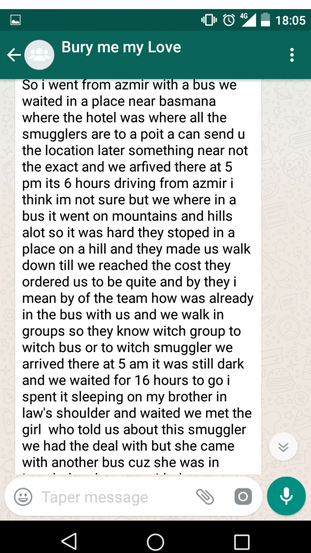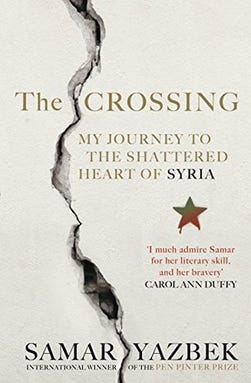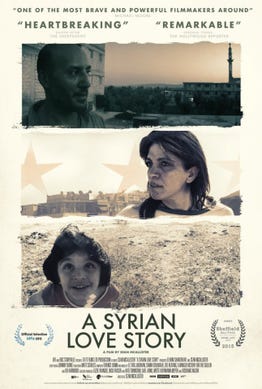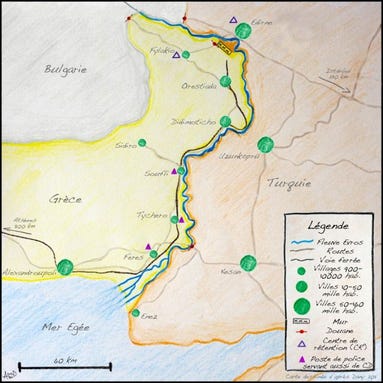Trending
Opinion: How will Project 2025 impact game developers?
The Heritage Foundation's manifesto for the possible next administration could do great harm to many, including large portions of the game development community.

Featured Blog | This community-written post highlights the best of what the game industry has to offer. Read more like it on the Game Developer Blogs or learn how to Submit Your Own Blog Post
How to write a game based on a sensitive topic such as the European refugee crisis? How to make this game feel real while remaining respectful of the people concerned? Here are a few tips based on my own experience.

===intro===
TIME 09:25
Nour =IMAGE nour-decorville
Majd =Already at the bus station?
Nour =Yep
Nour =Cab’s not there though 😕
*Trouble already. -> intro_A
*[You’re early.]Probably because you’re 15 minutes early... -> intro_B”
When I wrote the first lines of Bury Me, My Love, I had no idea they would become the actual first lines of Bury Me, My Love. I thought they were some kind of draft, something to work on later. But no. We kept them. Bury Me, My Love is a game about two lovers chatting via Whatsapp, and Whatsapp doesn't have an edit button.
If you haven’t heard of Bury Me, My Love, I suggest you to watch the trailer above, check the website, try the free prologue on Arte.tv or even better: download the game on your phone (iOs, Android)! But to put it in a few words: Bury Me My Love is the story of Nour, a young Syrian woman, fleeing her country with hope to find refuge in Europe while Majd, her husband, must stay in Homs to take care of his old parents. Like most torn Syrian families do, they’ll keep in touch using a mobile messaging app, and as Majd, the players will get a glimpse of the Syrian refugees’ struggles.
In this post-mortem, I will focus on the writing of Bury Me, My Love, since this is what I’ve been doing on this project, and I will start with some numbers:
Bury Me, My Love features:
40 different locations
19 different endings.
110 000 words in total (think Harry Potter and the Prisoner of Azkaban, Wuthering Heights, Lolita or Madame Bovary)
...written over 8 months
...by 2 authors: Florent Maurin and me.
Being also the producer and game designer, Florent Maurin had less time than he thought to write for the game, so I ended up writing most of it (75%-80%). I now will try to explain how I proceeded in the form of tips. Feel free to consider them as good advice if you think I did great or mistakes to avoid if you think I did poorly.
Dealing with the delicate topic of the refugees’ crisis, Bury Me My Love had to be heavily documented. Half of the work when writing on such a project is actually finding real-life stories to turn into fiction.
This clearly is the most important advice I can give. You can close the tab after this one.
For Bury Me, My Love, we were lucky to get to work with Dana, a young Syrian woman now living in Germany. Just like Nour (or is it the opposite?), Dana fled the war in Syria to find refuge in Europe, and a lot of Bury Me, My Love is actually inspired by Dana's journey.

But we didn't want to tell Dana’s story. We wanted to tell many stories, to show the extent of the Syrian refugees’ struggles. So we had to...
In Bury Me, My Love, almost nothing (if not nothing at all) was invented. Every little story is directly inspired from something we saw, we read, we heard. That’s because Bury Me, My Love is based on real-life events of course, but also because writing is basically stealing without getting caught (or it’s called plagiarism). The more material you’ll gather, the more you’ll find to steal.
Don’t restrict yourself to fiction, or non-fiction. Don’t restrict yourself to a single medium. Don’t restrict yourself at all. If you’re lucky enough to have a multimedia library nearby, that might be a great place to start. Browse every section and find what might interest you in every one of them. For Bury Me, My Love, we took inspiration from various materials, such as:
Literature:

Documentary movies:

Comics:

Historical Essays:

Children books:

Poetry:

Folktales:

Maps:

(We also spent a LOT of time on Google Street View)
But of course: the most common material we used is the work of journalists found online: facts, reports, records, pictures...And that leads to a whole bunch of advises:
This is journalism 101, and if you want to write on real-life events, and especially on sensitive topics, you'll have to act as a journalist. Every-time you read or watch something you have to ask yourself: “Who made this, who paid for this, and should I trust them on this specific subject?”
On a same event, you can bet you’ll read very different stories from The Syrian Arab News Agency (Syrian Government’s official news agency) and YPG-International (The People's Protection Units’s official news agency)
The more specific the information you’re looking for will get, the more difficult it it will be to find free reliable sources. Let’s say you need accurate information on a specific refugees’ protest that occurred one year ago in Serbia, but you need it in French because you don’t speak Serbian (and do speak French). Well, you might actually find it on Le Courrier des Balkans, a French news portal dedicated to the Balkans countries. But you can’t expect advertisers to pay for such a level of specificity, you will have to do it yourself.
The good news is: information is usually pretty cheap! Le Courrier des Balkans only cost 6€ a month. On LeMonde.fr, a single article can be bought for 2€. What are 2€ in a game budget? What are 6€? What are 100€ even? Maybe dedicate a hundred euros in your budget for buying information, and next time you’ll encounter a paywall, ask yourself “if this piece worth 1€?”. Spoiler: it probably is.
Google is the greatest search-engine in the world, it knows you so well it always finds what you are looking for. However, when you are documenting for a project, that is exactly what you want to avoid. You don’t want your own ideas thrown back at you, you want to learn new things, find new point of views. In order to avoid what's called the confirmation bias, try using a search engine which doesn't doesn't track you instead. I would personally suggest DuckDuckGo if you’re looking for results in English, and Qwant for results in French or German.
Guess what: Journalists' knowledge doesn't stop at their articles. If a journalist has worked on a topic you're interested in, you might still have a lot to learn from them. If there is a way to contact them, it might be worthy to ask if they would agree to answer a few questions, offer a beer, or a coffee (or actual payment if you’re asking for a lot).
For Bury Me My Love, we worked with Lucie Soullier (since she wrote the article the game took its inspiration from), but also with a few other ones who agreed to share some information for a drink.
It’s easy to get stuck in a narrative. Sometimes, you need to take a few steps back and realize you were looking at something from the wrong angle. Here’s an example: look at the news titles you’ll find if you’re documenting on Zaatari Refugee Camp:

Jobs, solar power plants, smart schools, football pitches, wedding dresses, falafels, even Angelina Jolie! Doesn't it seem like a nice place?
Well...it’s not. It’s a refugee camp. People didn't chose to live there. They are not allowed to leave. Families cram in small tents and have to face water shortages, electricity shortages, fires...even snow storms!
But it’s easy to think otherwise, because “life is still quite shitty in Zaatari refugee camp” or “refugees in Zaatari still missing their homes” aren't exactly news (the camp has been there since 2012), and journalists need to find new angles to talk about it. To avoid this kind of pitfalls you need to always remain critical, even with the sources you trust.
That’s it! You’ve got your stories! Now you just need to put the pieces together and start writing.

The fact that your fiction is based on real-life events doesn't necessarily makes it feel real. This is a whole different thing, and a whole different kind of work.
Having the stories right is one thing. Having the writing right is a whole different one. This is the reason why we kept working with Dana all along the writing phase. She was our editorial consultant and helped us with the tiniest details. If you want to know when Hungary shut down its borders, you can find the answer on the Internet, but let’s say you want to know how do you say shut up in Syria, how do you call Bachar el-Assad when texting with your friends or even if Road Runner and Wile E. Coyote had been aired on Syrian TV, it’s easier to have someone to ask to.
Ironically, all our exchanges were through a messaging app.

Dana also gave us feedbacks on everything we wrote and helped us rewrite some scenes that she thought weren't convincing enough, such as the one at the smugglers’ hotel in Izmir that felt like a piece of cake for Nour while it was one of Dana’s worst memory.
When writing on topical issues, it's tempting to write lengthy expositions. Afterl all: the player might not know what you are writing about, you might want to bring them up to speed. However, exposition will rarely make any sense in the mouths of your characters. Majd and Nour are a married couple, they have been living together in Homs for years. None of them need to be reminded what's currently happening in Syria. None of them need to be reminded why Nour is leaving. In this case, it's important to keep the exposition as subtle as possible, and remember: it's OK for the player to not get everything.
In his short novel A Simple Heart, Gustave Flaubert wrote:
“An old piano, standing beneath a barometer, was covered with a pyramid of old books and boxes.”
The old piano tells us something about the owners of the house (they probably belong to the bourgeoisie, one of them might play piano…). The old books and boxes tell us something too (they have a lot of stuff? They’re slobs?) but what does the barometer tells us? Nothing really...That’s what Roland Barthes calls the "effect of reality".
What makes a story feels real are those tiny useless things, because real life is full of tiny useless things (one might even say it’s what it’s all about). That is something we tried to keep in mind while writing Bury Me, My Love. that’s how you get lengthy sequences about fixing a broken zipper.

This is storytelling 101. No-one can relate to a perfect character since perfect characters don’t actually exist. In Bury Me, My Love, both characters are pretty flawed.
Nour lies a lot (even though the players don’t always notice it since she’s lying to them as well), and she’s very proud, which can lead her to various perilous situations.
Majd on the other hand tend to be easily jealous, and can sometimes make pretty racist comments. Note that in the end, some players happened to not like Majd at all. So we might have gone a bit too far with this one.

Here’s what Raymond Chandler wrote to Frederick Lewis Allen, editor of Harper’s Magazine,
in 1948:
“My theory was that [the readers] just thought they cared about... the action; that really, although they didn’t know it, they cared very little about the action. The things that they really cared about, and that I cared about, were the creation of emotion through dialogue and description; the things they remembered, that haunted them, were not for example that a man got killed, but that in the moment of death he was trying to pick a paper clip up off the polished surface of a desk, and it kept slipping away from him, so that there was a look of strain of his face and his mouth was half opened in a kind of tormented grin, and the last thing in the world he thought about was death. He didn’t even hear death knock at the door. That damn paper clip kept slipping away from his fingers and he just wouldn’t push it to the edge of the desk and catch it as it fell.”
Florent sent me this excerpt when we started working on Bury Me, My Love, and I tried to keep this writing advice in mind (and now I’m sharing it). There isn’t a lot of “action” in Bury Me, My Love, but I sure tried to put a lot of “paper clips” in there, to focus not on the important things, but on the seemingly insignificant little things surrounding them.

What’s meaningful isn’t that Nour arrives safely in Austria, it’s that, while doing so, she has Asmahan’s song Merry nights in Vienna in mind, and how this single thought appeases her.
This might sound counter-intuitive, after all: you want your story to feel likely, not the opposite! But how many time did you say to a friend “You’ll never believe what happened to me”, and how many time this friend actually had troubles believing you? Real life is weird, full of unlikely events, of confusing coincidences. To quote Josh Groban in Crazy ex-Girlfriend S03E04 (spoilers) :
“If you saw a movie that was like real life you’d be like:
“what the hell was this movie about? It was really all over the place!”
Life doesn't make narrative sense.”
In Bury Me, My Love, Nour mightencounter another Iraqi woman named Kelly. Kelly sure is an unusual name for a Iraqi woman but Nour isn’t going to ask her why her parents named her Kelly, it’s just rude! That’s a mystery she’ll have to live with, and eventually forget, just like the player.

Accidents are great. Accidents are beautiful. Even if they sometimes look like the point of an arrow diving into a butt.

Nour’s typo is actually a typo I made myself and Nour’s comment is actually what went through my head when it happened. Instead of correcting, I chose to leave the typo and to roll with it. Free joke! And it actually makes the conversation more relatable.
Same goes with this slip of the tongue (or should I say slip of the thumb?):

In French, “things” is “trucs”, and I accidentally wrote “turcs” instead, which means Turks, which actually made quite some sense since this occurred while Nour is in Turkey. Once again, I could have fixed the mistake, but I thought that if I slipped while not even being surrounded by Turks, Nour would DEFINITELY slip in her situation!
Once again: tiny thongs things, but the devil is in the detail, so they say.
Just...Look around you.
The fact that the story you’re writing isn’t about you shouldn't prevent you to let some details from your own life slip in.
In Bury Me, My Love, you play Majd chatting with his girlfriend through a messaging app. I do have a girlfriend and I do chat with her through messaging apps. Why not get some inspiration from there?
A few years ago, my girlfriend was going through a tough time. I don’t even remember the reason. On Facebook Messenger, I tried to comfort her by writing “Courage!” (“Hang in there!"). But my finger slipped, and I wrote “Courge!” instead (“Marrow!” or “Pumpkin!”. It actually was cleverly translated by “Hang in tree!” in English). It made her laugh and did comfort her a bit. Since then, whenever we want to say or write “Courage!” to each other, we say/write “Courge!” instead. It became our cute silly thing.

Now it’s Nour and Majd’s cute silly thing, and it might help making their relationship relatable.

That’s how we wrote Bury Me My Love. I hope those tips have been useful in one way or another. I wish you the best of luck for your future projects.
Courge!

You can download Bury Me, My Love on iOs or Android.
Pierre is sometimes for hire, check the entirety of his work here.
Read more about:
Featured BlogsYou May Also Like